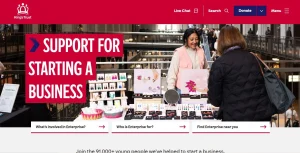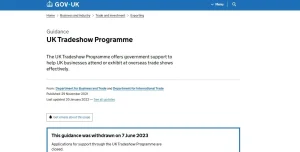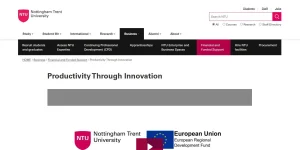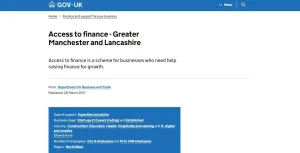Top 10 Government Grants for Small Business in the UK for 2025

Starting a business is a bold move, especially in a competitive and evolving economic climate like the UK’s. One of the biggest challenges new and small businesses face is securing the financial support they need to develop, scale, or simply get started.
Luckily, there are many government grants for small business ventures across the UK, and in 2025, the landscape is looking more supportive than ever.
These grants come in various forms and serve different business needs, from innovation to regional development. In this guide, you’ll find the most relevant and up-to-date grant schemes, along with what they offer and how to apply.
What Types of Government Grants Are Available for Small Businesses?
Government grants aren’t just about lump sums of money, there are several types of funding and support available, each catering to different business needs. Knowing the difference between them is key to finding the right opportunity.
- Direct Grants: These provide businesses with a specific amount of money to cover key expenses like purchasing equipment, marketing efforts, or staff training. They are non-repayable and are ideal for early-stage businesses needing initial funding or scaling operations.
- In-Kind Support: Instead of cash, the business receives access to services or physical products. This could include free access to cloud software, legal consultancy, product development tools, or even office space, depending on the grant provider.
- Voucher Schemes: These enable businesses to apply for vouchers covering partial costs of services such as broadband upgrades, cybersecurity solutions, or consulting services. They’re particularly useful for digital transformation.
- Tax Reliefs: Through schemes like SEIS or EIS, investors receive tax benefits when they invest in qualifying small businesses. This makes businesses more attractive to private investors.
- Development Grants: These are designed to support innovation, export growth, digital transformation, and sustainability efforts, often based on location or industry.
How Can a Small Business Qualify for Government Grants?

Each grant has its own eligibility criteria, but there are common factors across most programmes. Generally, for a business to qualify, it must:
- Be officially registered in the UK: This can be as a sole trader, partnership, or limited company. Registration through Companies House or HMRC is usually required as part of the application.
- Have fewer than 250 employees: Most UK grants are available to SMEs only, meaning your business must fall within the small or medium-sized enterprise classification.
- Be considered a Small or Medium-sized Enterprise (SME): Aside from headcount, this means your turnover should not exceed €50 million (approx. £43 million) and your balance sheet should not exceed €43 million.
- Operate within a relevant sector or region specified by the grant: Some grants are only open to specific industries (e.g., tech, retail, sustainability), while others are exclusive to regions like the North West, Scotland, or Wales.
- Show potential for economic impact, innovation, or job creation: Many grant providers want to see how your business will benefit the local or national economy.
- Present a clear business plan: This should outline how the funds will be used, expected results, and sustainability of the business.
Additional requirements may include financial stability, match-funding, or demonstration of trading history.
Where to Find Government Business Grants in the UK?
Knowing where to look is half the battle. Luckily, there are several reliable sources for finding active government grants for small businesses:
- Gov.uk Business Finance Support Finder: A government-maintained database that lets businesses filter grants and financial assistance based on location, industry, size, and purpose. It’s updated regularly and includes everything from loans to tax relief schemes.
- Local Enterprise Partnerships (LEPs): These are regional organisations that support economic growth at the local level. They offer area-specific grants, advice, and support to SMEs and often run initiatives funded by both local and national governments.
- Innovate UK: A leading innovation agency offering funding competitions for R&D projects. Perfect for tech-driven or research-focused businesses looking for substantial funding.
- Council and Growth Hubs: Local authorities and regional growth hubs often have their own grant schemes, especially for regeneration, retail, and high-street development. These are typically smaller grants but easier to access.
- Business Support Organisations: Banks, business groups, and accountancy firms often publish useful directories of current grants. Some may even provide application support services or advice.
Keeping an eye on these platforms ensures you don’t miss new funding opportunities as they launch.
Are Government Grants Taxable or Repayable?

Most government grants are non-repayable, making them highly attractive to new and small businesses. However, this doesn’t automatically mean they’re tax-free. In most cases, government grants count as taxable income, and you’ll need to declare them when filing your accounts with HMRC.
This means even if you’re awarded a direct grant that doesn’t need to be paid back, the amount may still be subject to Corporation Tax or income tax depending on your business structure. It’s important to factor this into your financial planning to avoid unexpected tax liabilities.
Some programmes, like Start-Up Loans (often delivered through The Prince’s Trust or British Business Bank), may include a loan element that comes with repayment terms and interest. These are not grants but are commonly listed alongside grant options, so understanding the difference is crucial.
Also, be aware that failure to meet grant usage or reporting conditions can lead to clawback provisions, where funds must be returned. Always read the terms and conditions before accepting funding.
What Should Businesses Consider Before Applying?
Applying for a grant isn’t just about eligibility, it’s about readiness. Consider these factors before you start:
- Read the fine print: Every grant comes with unique requirements, from business type to sector and timing. Ignoring small details can lead to rejection.
- Prepare documents in advance: You’ll often need to provide financial forecasts, recent accounts, proof of registration, and a strong business plan that aligns with the grant’s objectives.
- Plan for reporting: Many grants come with performance criteria or reporting obligations. You may need to prove how the grant helped, show receipts, or submit updates over time.
- Mind the deadlines: Funding windows can be short. Missing an application cut-off could mean waiting months or a full year to reapply.
- Seek expert advice: Local business support centres, accountants, or grant writing consultants can offer helpful insights, increase your chances of success, and ensure compliance with all conditions.
Approaching a grant with preparation, clarity, and purpose increases both your approval chances and your ability to use the funds effectively.
Top 10 Government Grants for Small Business in the UK for 2025
1. The Prince’s Trust Enterprise Programme

The Prince’s Trust Enterprise Programme is an exceptional initiative aimed at empowering young people aged 18 to 30 who aspire to start their own business but lack the resources, knowledge, or confidence to do so. This government-backed programme goes beyond traditional funding by offering tailored business training, mentorship, and access to financial support.
Participants begin with a free series of enterprise workshops that explore business basics, from how to write a business plan and create a budget to understanding branding, legal structures, and customer engagement.
Those who continue receive personal guidance and long-term mentorship to help them refine their ideas and prepare for launch.
Eligible applicants can also apply for financial support, including a Start-Up Grant of up to £5,000, and a Start-Up Loan between £500 and £25,000, repayable over 1 to 5 years at a competitive 6.2% APR.
What sets this programme apart is its hands-on, human approach. With personal mentorship and business coaching, it’s perfect for young entrepreneurs without previous experience or access to capital.
2. Innovate UK Smart Grants Programme

This is the UK’s flagship innovation funding competition, focused on supporting pioneering small businesses with ground-breaking ideas.
Whether your business is developing new technology, products, or services, the Innovate UK Smart Grants Programme is designed to help bring your project to life.
These grants are especially useful for R&D-intensive companies looking to create significant economic or societal impact.
| Criteria | Details |
|---|---|
| Funding | Share of £25 million, available through multiple rounds |
| Eligibility | UK-registered SMEs with innovation-led, scalable projects |
| Eligible Sectors | AI, health, engineering, sustainability, energy, and more |
| Use of Funds | Prototyping, research, testing, market development |
| Application Cycle | Quarterly competitions |
Applications are assessed on technical merit, feasibility, return on investment, and market potential. Although competitive, successful applicants benefit from game-changing financial support, industry visibility, and expert feedback throughout the grant period.
3. Seed Enterprise Investment Scheme (SEIS)

SEIS isn’t a direct grant to the business itself, but it plays a crucial role in helping small businesses raise capital. It’s a government-backed scheme offering tax relief to individuals who invest in early-stage UK companies.
By reducing the risk for investors, SEIS makes it more likely that small businesses can secure funding to launch or grow.
- Raise up to £250,000 through SEIS-eligible funding rounds
- Investors receive 50% income tax relief on their investment
- Businesses must be under 2 years old to qualify
- Must have fewer than 25 employees at the time of application
- Net assets must be less than £200,000
Seed Enterprise Investment Scheme (SEIS) is ideal for high-risk ventures that traditional lenders may avoid. Though not a cash grant, it can open doors to equity funding, angel investment, or seed capital.
Entrepreneurs looking to attract funding should consider making their business SEIS-compliant, which can make a huge difference in securing initial investments.
4. UK Trade Show Programme

The UK Trade Show Programme is designed to help small and medium-sized businesses explore international markets by exhibiting at overseas trade shows.
Organised by the Department for Business and Trade, the programme reduces the financial burden of going global by covering critical event-related costs.
The grant covers between £2,000 and £4,000 of eligible expenses including space rental, stand design, marketing collateral, and logistics.
On top of funding, participating businesses gain access to expert advice, export guidance, and strategy coaching to maximise return on investment from international events.
This programme is particularly valuable for businesses with export-ready products or services seeking exposure to new customers, investors, and partners abroad. Whether attending a tech, manufacturing, or food trade fair, SMEs can showcase their innovations to a wider audience.
It’s also a stepping stone into government-supported international trade networks, making it easier to develop relationships with overseas buyers and distributors.
5. British Council Grants

The British Council’s grant programmes primarily support educational and cultural initiatives, but they also extend to businesses involved in international research, innovation, and social impact.
These grants are particularly relevant to start-ups and organisations working in collaboration with universities, NGOs, or global development projects.
- Supports joint projects focused on education, innovation, health, or climate
- Offers seed funding to help pilot new ideas or build long-term partnerships
- Encourages cross-cultural and international collaboration
- Funding rounds vary throughout the year, depending on the initiative
- Ideal for businesses aligned with social or educational objectives
These grants are well suited to organisations tackling global challenges or developing sustainable technologies in collaboration with academic institutions.
Businesses must show measurable impact, a clear structure for collaboration, and a commitment to inclusion or innovation. By working across sectors and borders, the British Council supports businesses aiming to build a better future.
6. WRAP Grant Schemes

WRAP (Waste and Resources Action Programme) offers several funding schemes focused on supporting sustainable business practices and reducing environmental impact. These grants are designed to help companies develop or scale solutions that support a circular economy.
| Scheme | Purpose | Who It’s For | Funding Support |
|---|---|---|---|
| Circular Economy Fund | Promote reuse and waste reduction | Manufacturers, recyclers | Up to £100,000 |
| Plastics Innovation Fund | Develop sustainable packaging | Packaging and retail firms | Grants + partnership support |
| Resource Efficiency Fund | Upgrade to eco-friendly equipment | SMEs in various industries | Match-funded grants available |
These grants are ideal for companies wanting to reduce waste, improve recycling infrastructure, or create innovative green products.
If your business aligns with the UK’s net-zero goals or environmental targets, WRAP offers a strong support mechanism for long-term sustainability projects.
7. Sterling Road North West Grant

Sterling Road’s North West Grant is a micro-funding opportunity for early-stage entrepreneurs and overlooked founders in the North West of England. This grant provides a low-barrier route to financial support, ideal for testing new ideas or launching initial prototypes.
- Awards £1,000 to 25 early-stage business ideas each year
- Open to all industries, though tech and software get priority
- The application process takes just 10–15 minutes
- No trading history or revenue is required to qualify
- Focuses on diversity, inclusion, and social impact
It’s an excellent first step for entrepreneurs who are underrepresented or lack access to traditional funding.
Sterling Road offers more than just money, they provide a chance to gain visibility, credibility, and momentum at a critical early stage. This grant can be the spark that helps promising ideas move from the idea phase into viable start-ups.
8. Digital High Street Fund

As traditional retailers face increased competition from online platforms, the Digital High Street Fund offers vital support to small, independent businesses looking to modernise. This grant enables high street shops to adopt digital technologies and stay competitive.
Funding of up to £1,500 is available to support the development of e-commerce websites, upgrade digital payment systems, adopt CRM platforms, or boost online marketing efforts. Retailers must provide a clear plan for how the funds will be used and how they will improve digital engagement or sales.
The goal is to help retailers thrive in an increasingly digital economy by embracing tools that attract and retain customers online.
Local councils often manage this fund, so criteria and availability may vary by region. Nonetheless, this grant is an accessible way for shops to bridge the gap between physical and online retail experiences.
9. Productivity Through Innovation Grant

This regional grant targets SMEs located in Derby, Derbyshire, and Nottingham who are ready to boost productivity and innovation through skilled hiring.
The funding is designed to support businesses bringing in graduate-level employees to fill strategic roles, often aligned with innovation, digital transformation, or sustainability goals.
| Risks | Rewards |
|---|---|
| Limited access to original investment | Fixed, predictable monthly income |
| Inflation can reduce real value | No investment management needed |
| Early exit penalties may apply | Offers financial peace of mind |
| Lower long-term returns | Tailored to retirement needs |
This grant helps bridge the skills gap in SMEs by making it more financially viable to employ high-potential graduates.
The application must show how the hire will contribute to innovation or growth. It’s a great opportunity to strengthen your team without overburdening your payroll costs.
10. Access to Finance – Greater Manchester and Lancashire

This programme isn’t a direct financial grant, it’s a strategic support scheme aimed at helping SMEs become investment-ready. Designed for small businesses in Greater Manchester and Lancashire, Access to Finance offers expert financial advice, mentoring, and practical assistance in preparing funding applications.
Businesses receive one-on-one support in developing financial plans, refining business strategies, building investor decks, and identifying relevant funding sources such as angel investment, private equity, or government loans.
For early-stage or growth-focused companies lacking financial expertise, this programme provides the insight and structure needed to secure external capital.
While there’s no immediate cash handout, the long-term benefit lies in accessing larger, more sustainable funding streams through proper preparation.
This programme is especially valuable for founders navigating investment for the first time and seeking professional guidance to position themselves for growth.
Top 10 Government Grants for Small Business in the UK – 2025 Comparison
| Grant Name | Funding Amount | Who It's For | Key Benefit | Region |
|---|---|---|---|---|
| Prince’s Trust Enterprise Programme | Up to £5,000 (Grant) + £25,000 (Loan) | Entrepreneurs aged 18–30 | Start-up training, mentoring, and funding | UK-wide |
| Innovate UK Smart Grants | Share of £25 million | SMEs with innovative R&D projects | High-level R&D funding for game-changing ideas | UK-wide |
| SEIS | Up to £250,000 (Equity) | Early-stage businesses and investors | Tax relief to investors to help raise capital | UK-wide |
| UK Trade Show Programme | £2,000–£4,000 | Export-ready UK SMEs | Support to exhibit at international trade events | UK-wide |
| British Council Grants | Varies (Project-based) | Research & social enterprise partnerships | International collaboration & innovation | UK-wide / Global partnerships |
| WRAP Grant Schemes | Up to £100,000 | Environmentally conscious SMEs | Circular economy & recycling project funding | UK-wide |
| Sterling Road North West Grant | £1,000 | Underrepresented founders in NW England | Quick-start funding for early-stage ideas | North West England |
| Digital High Street Fund | Up to £1,500 | Independent high street retailers | Support to digitise retail and boost online presence | Varies by local council |
| Productivity Through Innovation Grant | 20% of graduate salary | SMEs in innovation roles | Funding to hire graduate-level talent | Nottingham, Derby, Derbyshire |
| Access to Finance (GM & Lancashire) | Advisory support only | Growth-ready SMEs | Investment readiness and business plan support | Greater Manchester & Lancashire |
Conclusion
Government grants for small business owners in the UK can be the difference between an idea staying on paper or becoming a successful venture.
With options ranging from innovation funding to regional support and digital transformation, there’s a grant suited to almost every need.
By understanding eligibility and choosing the right programme, businesses can access crucial financial support without giving away equity or taking on debt, making 2025 a promising year for UK entrepreneurs ready to grow.
FAQs
How long does it take to receive a government grant?
It varies by scheme, from a few weeks for micro-grants to several months for larger funding programmes.
Can I apply for more than one grant?
Yes, provided you meet the criteria and the funding sources allow it. Always read the fine print.
Are these grants taxable?
Most are. Unless explicitly tax-free, government grants must be declared as income.
Can a sole trader apply for a business grant?
Yes, many grants accept applications from sole traders as well as limited companies.
Do I have to pay the grant back?
No, government grants are generally non-repayable, unlike loans.
Where can I find updated grant listings?
Check Gov.uk, Local Enterprise Partnerships, and your local council websites regularly.
What if I misuse the grant?
Misuse can lead to repayments, audits, or being blacklisted from future funding opportunities.






